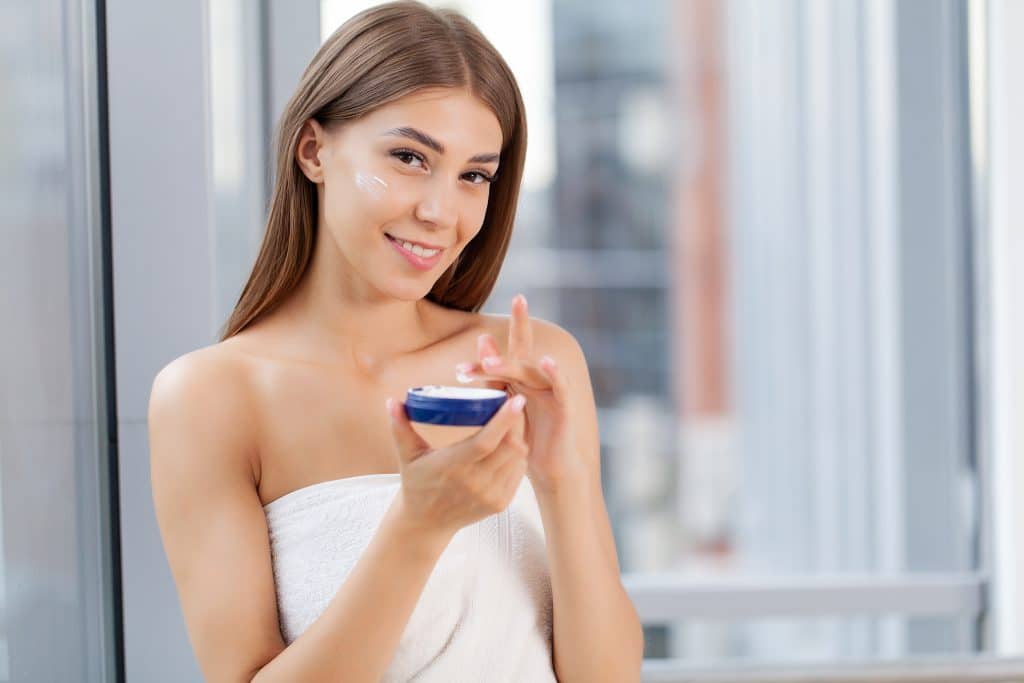Ever find yourself investing time and money into a skincare routine, only to be met with dry, flaky skin? You’re not alone. Many people are unaware that some every day habits can actually exacerbate skin dryness. This article aims to shed light on these standard practices, offering you a roadmap to healthier, more hydrated skin. From the role of hydration to the importance of sun protection, you’ll discover actionable tips to help you break free from the cycle of habits that cause dry skin.
Contents
The Role Of Hydration

Hydration plays a pivotal role in maintaining healthy skin. When the body is dehydrated, it can lead to a host of issues, including dry skin. Dehydration reduces the skin’s ability to retain moisture, making it more susceptible to flaking and itching. It’s not just about the amount of water you drink; the types of fluids you consume also matter. Beverages like coffee and alcohol are diuretics, which means they can deplete your body’s water levels, leaving your skin parched.
The solution seems simple: drink more water. However, it’s not just about chugging down eight glasses a day. Pay attention to the signs your body is giving you. If you’re feeling thirsty, your skin is probably thirsty too. Also, consider incorporating hydrating foods like watermelon and cucumber into your diet. These foods contain a high water content and can contribute to your overall hydration levels.
Overexposure To Hot Water

There’s something incredibly comforting about a hot shower or bath, especially after a long day. However, what feels like a treat for your body can be a nightmare for your skin. Hot water can strip away the skin’s natural oils, leaving it dry and vulnerable. This is because hot water disrupts the lipid barriers in the skin, making it difficult to retain moisture.
If you can’t resist the allure of a hot shower, try to limit your time under the water and opt for lukewarm temperatures instead. Another tip is to apply a hydrating body lotion immediately after you step out of the shower. This can help lock in moisture and prevent your skin from drying out. Remember, it’s not just about avoiding hot water; it’s about adopting practices that support your skin’s natural ability to retain moisture.
Harsh Skincare Products

Navigating the skincare aisle can be overwhelming, with countless products claiming to offer the secret to perfect skin. However, not all skincare products are created equal. Some contain harsh ingredients like alcohol and artificial fragrances that can dry out your skin. These ingredients can disrupt the skin’s natural pH balance, leading to dryness and irritation.
Instead of falling for marketing hype, focus on the ingredient list. Look for products that contain hydrating ingredients like hyaluronic acid and glycerin. These substances can help your skin retain moisture, making them excellent choices for combating dryness. Also, consider opting for products labeled “fragrance-free” or “for sensitive skin” to minimize the risk of irritation.
Over-Exfoliating The Skin

Exfoliation is often touted as the key to radiant, youthful skin. While it’s true that exfoliating can remove dead skin cells and promote cell turnover, overdoing it can have the opposite effect. Excessive exfoliation can damage the skin’s natural barrier, making it more susceptible to dryness and irritation. This is because the process can remove not just dead skin cells but also the natural oils that keep your skin hydrated.
If you’re experiencing signs of over-exfoliation like redness, sensitivity, or dry patches, it might be time to reassess your routine. Limit exfoliation to once or twice a week and opt for a gentle, hydrating exfoliant. Also, make sure to follow up with a moisturizer to help your skin recover and retain its natural moisture.
Ignoring Humidity Levels

Environmental factors often go unnoticed when considering skin health, yet they play a significant role. One such factor is humidity or the amount of moisture in the air. Low humidity levels can sap the moisture from your skin, leaving it dry and flaky. This is especially common during winter months when indoor heating can create particularly dry conditions. Even air-conditioned spaces in the summer can have a similar drying effect on your skin.
The good news is that you can take control of your environment to some extent. Consider investing in a humidifier to add moisture to the air, especially in rooms where you spend a lot of time, like the bedroom or office. Alternatively, hydrating facial sprays can offer a quick fix, providing your skin with a burst of moisture throughout the day. These solutions can help you combat the drying effects of low humidity and keep your skin feeling fresh.
Poor Diet Choices

What you put into your body is just as important as what you put on it when it comes to skin health. A diet high in salt, sugar, and processed foods can lead to dehydration, contributing to dry skin. These foods can also cause inflammation, which exacerbates skin issues. It’s not just about avoiding certain foods; it’s about embracing a balanced diet that nourishes your skin from within.
To keep your skin hydrated and healthy, focus on foods rich in essential fatty acids, antioxidants, and vitamins. Foods like salmon, avocados, and berries can provide the nutrients your skin needs to maintain its natural moisture barrier. Additionally, consider drinking herbal teas that have skin-loving ingredients like chamomile or green tea. These small dietary changes can make a big difference in the texture and hydration levels of your skin.
Inadequate Moisturizing

Moisturizing is a crucial step in any skincare routine, yet it’s often misunderstood. Some people think that if their skin is oily, they don’t need to moisturize or that moisturizing can exacerbate skin problems. This is a misconception. Skipping this vital step can actually lead to an overproduction of oil as your skin tries to compensate, which can result in even drier skin.
Timing is everything when it comes to moisturizing effectively. The best time to apply a moisturizer is immediately after cleansing while your skin is still damp. This helps to lock in moisture and keeps your skin hydrated for longer periods. Also, not all moisturizers are created equal. Look for products that contain ingredients like ceramides and hyaluronic acid, which are excellent for maintaining skin hydration.
Neglecting Sun Protection

It’s a common misconception that tanning can give your skin a healthy glow. In reality, exposure to UV rays from the sun can severely dry out your skin. The sun’s rays break down the skin’s collagen and elastin fibers, leading to premature aging and dryness. Even if you’re not directly sunbathing, daily exposure to the sun during regular activities can have a cumulative effect on your skin’s moisture levels.
Sun protection is not just for beach days; it’s a daily necessity. Make it a habit to apply sunscreen with at least SPF 30 on all exposed skin, even on cloudy days or during winter months. Wearing protective clothing like wide-brimmed hats and long sleeves can also help shield your skin from harmful UV rays. By taking these precautions, you’re not only preventing dry skin but also reducing the risk of skin cancer and premature aging.
Time To Reevaluate Your Skincare Habits
Navigating the path to hydrated, healthy skin doesn’t have to be a maze of confusion. By being mindful of everyday habits like hydration, skincare choices, and even sun protection, you can make a significant impact on your skin’s health. Remember, it’s not just about avoiding harmful practices; it’s about adopting a holistic approach that nourishes your skin from the inside out!


